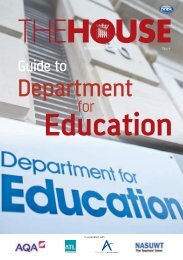Oracy
2fcBkno
2fcBkno
You also want an ePaper? Increase the reach of your titles
YUMPU automatically turns print PDFs into web optimized ePapers that Google loves.
Some solutions<br />
Every other Wednesday at Highbury<br />
Grove School teaching finishes at<br />
2pm, and staff receive two hours of<br />
training. Staff can join a ‘rhetoric and<br />
oracy’ stream that explores the theory<br />
and rationale for oracy-based teaching<br />
methods as well as practical ways in<br />
which teachers of different subjects could<br />
improve their practice. Andrew Fitch<br />
explains:<br />
Vicki Barsby took part in the CPD stream,<br />
and says:<br />
“The idea is that those teachers then go back to their<br />
departments, and during their department training<br />
they will feed in some of that, and over several years<br />
… as teachers don’t do the same stream, we’ll create<br />
enough of a body of teachers who feel at least more<br />
confident to … start trying to lay that foundation”<br />
Andrew Fitch, Head of English and Director for Spoken Literacy, Highbury<br />
Grove School<br />
“What was useful was talking to other staff about<br />
what they do […and hearing about] actual things that<br />
I can physically do in the classroom, …and coming<br />
back together, and talking through how it went”<br />
Vicki Barsby, English teacher, Highbury Grove School<br />
According to Vicki, the training helped teachers learn about talk’s relevance and importance and gave<br />
them a chance to discuss how it could be applied in their classes.<br />
Riz Saleem says training can send a<br />
signal to staff that a school is serious<br />
about supporting a particular approach<br />
to teaching and learning. Opportunities to<br />
share and evaluate ideas with colleagues<br />
are also critical:<br />
“The reason I feel confident is because we have<br />
enough training in school, and we have staff<br />
meetings and all teachers come and share ideas, we<br />
have joint planning sessions…. If we do ever feel that<br />
an activity isn’t working for our own group we always<br />
re-evaluate and ask somebody else for an idea”<br />
Riz Saleem, year 6 class teacher, Eastwood Primary School<br />
Jan Carrier explains that even where teachers do not receive ‘formal’ training, the school expects its<br />
more experienced teachers to plan with less experienced staff as part of their development.<br />
School 21 believes that staff should not have to sit through training unless it is of a quality comparable<br />
to what it would offer its pupils. In addition to receiving two hours of training each week, the school uses<br />
experiential CPD to encourage the spread of ideas and skills. Amy Gaunt and Peter Hyman both explain<br />
assemblies are a good opportunity for staff and pupils alike to model great oracy. Assemblies help<br />
reinforce a school culture that values and encourages active talking and listening, but also provide<br />
an opportunity for staff to see how other teachers develop oracy.<br />
Subject relevance<br />
A number of interviewees argue that achieving consistency of approach across subjects can be a<br />
challenge to effective practice, particularly at secondary and FE level.<br />
“[Staff] know that it ought to be a priority…. They’ve heard me talking<br />
endlessly about all this, and therefore I think they would know that it’s<br />
important, but the reality is that I don’t see [it] as much as I ought to”<br />
Geoff Barton, Headteacher, King Edward VI School<br />
This is partly because of the differences between subjects. Interviewees feel that some teachers do not<br />
believe oracy is relevant or important in their subject, and some do not believe it is an effective way to<br />
teach. As one English teacher put it, “I know individual teachers who just make it difficult, who say, ‘you<br />
can’t do that in science’.”<br />
64




